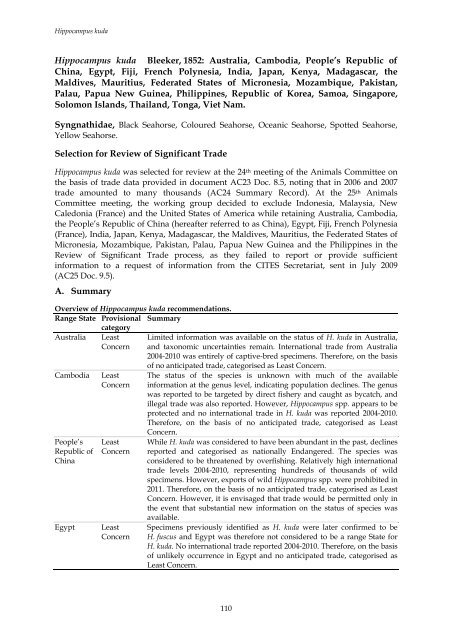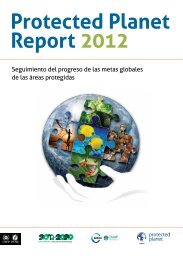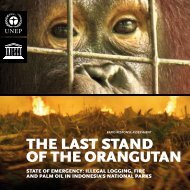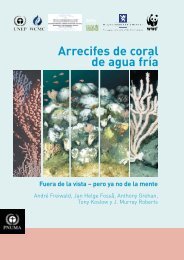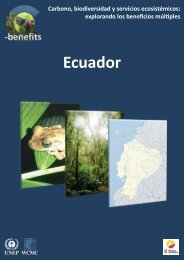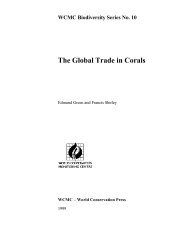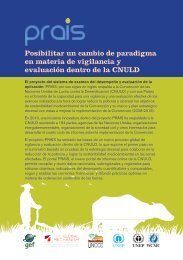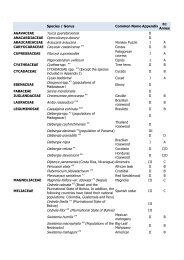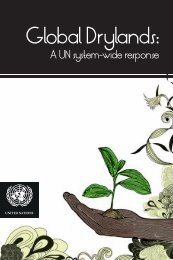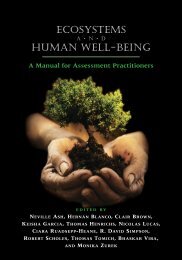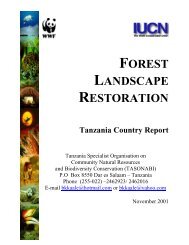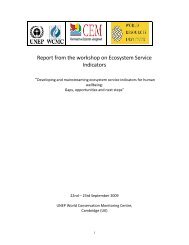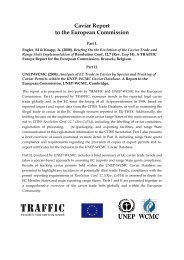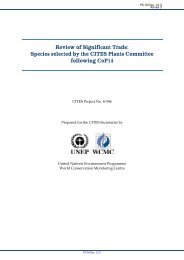2012. Review of Significant Trade - Cites
2012. Review of Significant Trade - Cites
2012. Review of Significant Trade - Cites
Create successful ePaper yourself
Turn your PDF publications into a flip-book with our unique Google optimized e-Paper software.
Hippocampus kuda<br />
Hippocampus kuda Bleeker, 1852: Australia, Cambodia, People’s Republic <strong>of</strong><br />
China, Egypt, Fiji, French Polynesia, India, Japan, Kenya, Madagascar, the<br />
Maldives, Mauritius, Federated States <strong>of</strong> Micronesia, Mozambique, Pakistan,<br />
Palau, Papua New Guinea, Philippines, Republic <strong>of</strong> Korea, Samoa, Singapore,<br />
Solomon Islands, Thailand, Tonga, Viet Nam.<br />
Syngnathidae, Black Seahorse, Coloured Seahorse, Oceanic Seahorse, Spotted Seahorse,<br />
Yellow Seahorse.<br />
Selection for <strong>Review</strong> <strong>of</strong> <strong>Significant</strong> <strong>Trade</strong><br />
Hippocampus kuda was selected for review at the 24 th meeting <strong>of</strong> the Animals Committee on<br />
the basis <strong>of</strong> trade data provided in document AC23 Doc. 8.5, noting that in 2006 and 2007<br />
trade amounted to many thousands (AC24 Summary Record). At the 25 th Animals<br />
Committee meeting, the working group decided to exclude Indonesia, Malaysia, New<br />
Caledonia (France) and the United States <strong>of</strong> America while retaining Australia, Cambodia,<br />
the People’s Republic <strong>of</strong> China (hereafter referred to as China), Egypt, Fiji, French Polynesia<br />
(France), India, Japan, Kenya, Madagascar, the Maldives, Mauritius, the Federated States <strong>of</strong><br />
Micronesia, Mozambique, Pakistan, Palau, Papua New Guinea and the Philippines in the<br />
<strong>Review</strong> <strong>of</strong> <strong>Significant</strong> <strong>Trade</strong> process, as they failed to report or provide sufficient<br />
information to a request <strong>of</strong> information from the CITES Secretariat, sent in July 2009<br />
(AC25 Doc. 9.5).<br />
A. Summary<br />
Overview <strong>of</strong> Hippocampus kuda recommendations.<br />
Range State Provisional Summary<br />
category<br />
Australia Least<br />
Concern<br />
Limited information was available on the status <strong>of</strong> H. kuda in Australia,<br />
and taxonomic uncertainties remain. International trade from Australia<br />
2004-2010 was entirely <strong>of</strong> captive-bred specimens. Therefore, on the basis<br />
<strong>of</strong> no anticipated trade, categorised as Least Concern.<br />
Cambodia<br />
People’s<br />
Republic <strong>of</strong><br />
China<br />
Egypt<br />
Least<br />
Concern<br />
Least<br />
Concern<br />
Least<br />
Concern<br />
The status <strong>of</strong> the species is unknown with much <strong>of</strong> the available<br />
information at the genus level, indicating population declines. The genus<br />
was reported to be targeted by direct fishery and caught as bycatch, and<br />
illegal trade was also reported. However, Hippocampus spp. appears to be<br />
protected and no international trade in H. kuda was reported 2004-2010.<br />
Therefore, on the basis <strong>of</strong> no anticipated trade, categorised as Least<br />
Concern.<br />
While H. kuda was considered to have been abundant in the past, declines<br />
reported and categorised as nationally Endangered. The species was<br />
considered to be threatened by overfishing. Relatively high international<br />
trade levels 2004-2010, representing hundreds <strong>of</strong> thousands <strong>of</strong> wild<br />
specimens. However, exports <strong>of</strong> wild Hippocampus spp. were prohibited in<br />
2011. Therefore, on the basis <strong>of</strong> no anticipated trade, categorised as Least<br />
Concern. However, it is envisaged that trade would be permitted only in<br />
the event that substantial new information on the status <strong>of</strong> species was<br />
available.<br />
Specimens previously identified as H. kuda were later confirmed to be<br />
H. fuscus and Egypt was therefore not considered to be a range State for<br />
H. kuda. No international trade reported 2004-2010. Therefore, on the basis<br />
<strong>of</strong> unlikely occurrence in Egypt and no anticipated trade, categorised as<br />
Least Concern.<br />
110


